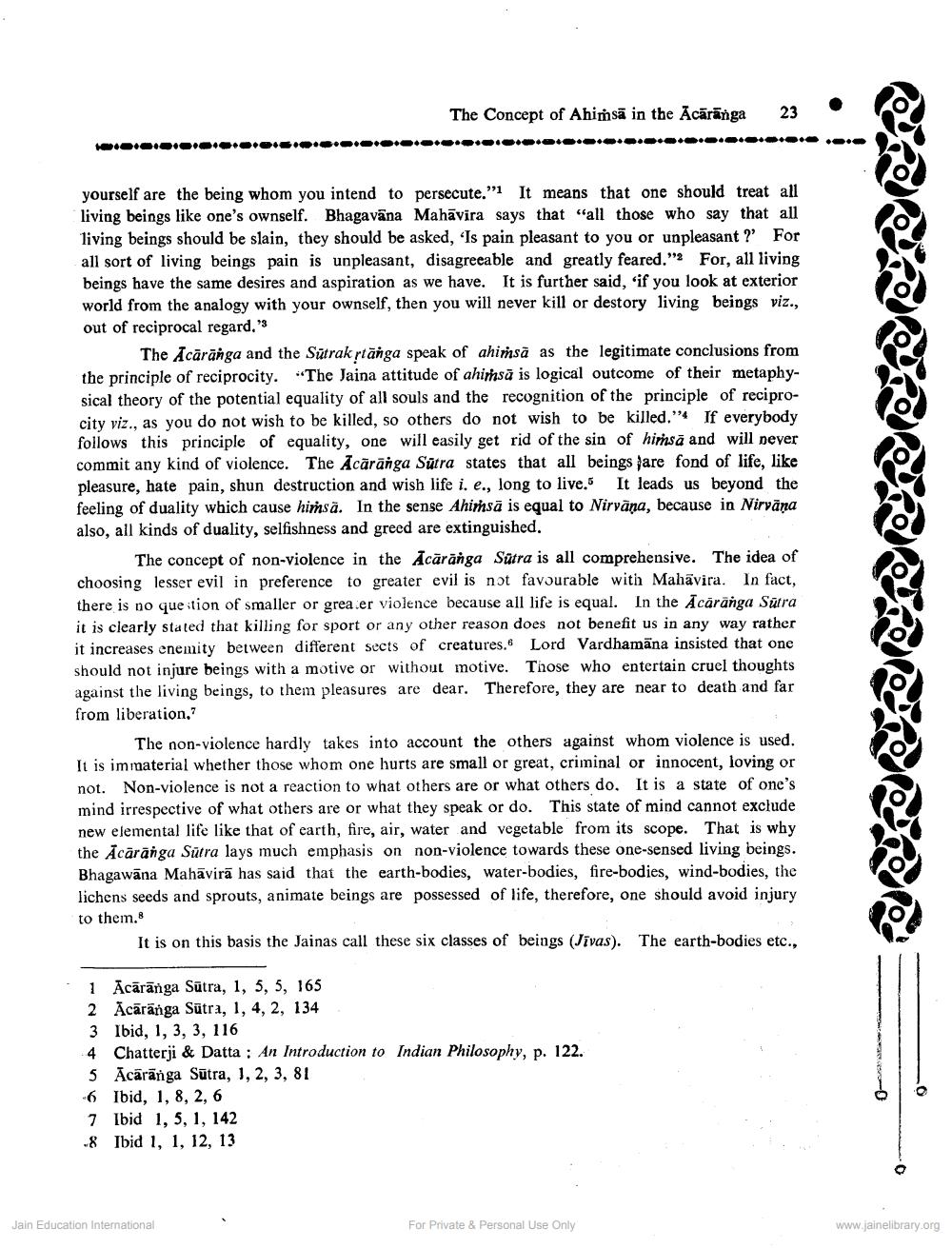________________
The Concept of Ahimsa in the Acārānga 23 O.O.O.O.O................................
1.0
[email protected].
yourself are the being whom you intend to persecute.” It means that one should treat all living beings like one's ownself. Bhagavāna Mahāvira says that all those who say that all living beings should be slain, they should be asked, 'Is pain pleasant to you or unpleasant ? For all sort of living beings pain is unpleasant, disagreeable and greatly feared.” For, all living beings have the same desires and aspiration as we have. It is further said, 'if you look at exterior world from the analogy with your ownself, then you will never kill or destory living beings viz., out of reciprocal regard."
The Acārānga and the Sūtrak stānga speak of ahiṁsā as the legitimate conclusions from the principle of reciprocity. “The Jaina attitude of ahimsā is logical outcome of their metaphysical theory of the potential equality of all souls and the recognition of the principle of reciprocity viz., as you do not wish to be killed, so others do not wish to be killed." If everybody follows this principle of equality, one will easily get rid of the sin of hiṁsā and will never commit any kind of violence. The Acäränga Sutra states that all beings dare fond of life. like pleasure, hate pain, shun destruction and wish life i. e., long to live. It leads us beyond the feeling of duality which cause hiṁsā. In the sense Ahiṁsā is equal to Nirvana, because in Nirvāna also, all kinds of duality, selfishness and greed are extinguished.
The concept of non-violence in the Acārānga Sūtra is all comprehensive. The idea of choosing lesser evil in preference to greater evil is not favourable with Mahāvira. In fact, there is no queition of smaller or grea er violence because all life is equal. In the Acaranga Sutra it is clearly stated that killing for sport or any other reason does not benefit us in any way rather it increases enemity between different sects of creatures. Lord Vardhamana insisted that one should not injure beings with a motive or without motive. Those who entertain cruel thoughts against the living beings, to them pleasures are dear. Therefore, they are near to death and far from liberation,
The non-violence hardly takes into account the others against whom violence is used. It is immaterial whether those whom one hurts are small or great, criminal or innocent, loving or not. Non-violence is not a reaction to what others are or what others do. It is a state of one's mind irrespective of what others are or what they speak or do. This state of mind cannot exclude new elemental life like that of earth, fire, air, water and vegetable from its scope. That is why the Acaränga Sūtra lays much emphasis on non-violence towards these one-sensed living beings. Bhagawāna Mahävirā has said that the earth-bodies, water-bodies, fire-bodies, wind-bodies, the lichens seeds and sprouts, animate beings are possessed of life, therefore, one should avoid injury to them.
It is on this basis the Jainas call these six classes of beings (Jivas). The earth-bodies etc.,
1 Ācārānga Sūtra, 1, 5, 5, 165 2 Acāranga Sutra, 1, 4, 2, 134 3 Ibid, 1, 3, 3, 116 4 Chatterji & Datta : An Introduction to Indian Philosophy, p. 122. 5 Ācāranga Sūtra, 1, 2, 3, 81 6 Ibid, 1, 8, 2, 6 7 Ibid 1, 5, 1, 142 .8 Ibid 1, 1, 12, 13
Jain Education International
For Private & Personal Use Only
www.jainelibrary.org
